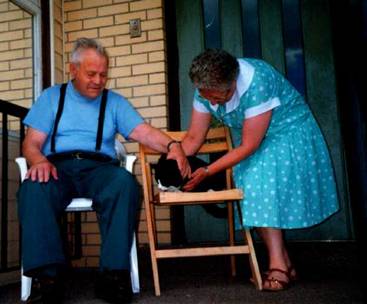|
|
Risk of Suicide Higher Among Ailing Seniors,
New Research Shows
By Andre Picard, Reuters Health
Canada
June 15, 2004

Having common medical conditions such as heart disease, emphysema and incontinence can markedly increase the likelihood that seniors will commit suicide, a new Canadian study reveals.
The research also sheds new light on how frequently such psychiatric illnesses as depression, schizophrenia and anxiety push older people to kill themselves, and draws attention to just how common suicide is among Canadians over the age of 65.
"Suicide is a remarkably common cause of death, particularly among the elderly," Donald Redelmeier, a senior scientist at the Institute for Clinical Evaluative Sciences, said in an interview.
"Suicide is not only prevalent, it is entirely preventable, and our inability to prevent these deaths is shattering a lot of lives -- both seniors and their family members," he said.
The study, published in today's edition of the Archives of Internal Medicine, reveals that most of the seniors studied had visited a physician shortly before taking their lives. It also shows that the vast majority of those who committed suicide were not suffering from end-stage illness.
Dr. Redelmeier said this suggests that health professionals, family members and seniors themselves need to pay a lot more attention to the potential for suicide among people with common physical and mental illnesses.
"When a person has heart disease, we can't just treat their heart," he said.
Fran, a 71-year-old Toronto woman (she asked to not be otherwise identified), agreed with that assessment. When she was diagnosed with a chronic illness that affected her mobility and her ability to drive, Fran became acutely depressed and her thoughts quickly turned to suicide.
"I hated what was happening to me," she said. While she was not that sick, Fran felt she was losing her independence and dignity, and that she was nothing more than a burden on her family.
"It just took away my will to live," she said.
Fran can recount her feelings of despair because, instead of killing herself, she got help -- but only after her children insisted.
The new research suggests that, isolated and alone, many seniors don't get help. Instead, they kill themselves.
Among older men, the method of choice is a self-inflicted gunshot, and among women it is drug overdose. Hanging is the second most common form of suicide for both genders.
To conduct the study, researchers examined the records of 1,354 seniors who were known to have killed themselves in the province between 1992 and 2000. (It is commonly accepted that the real suicide rate is much higher than the reported rate because non-violent deaths, particularly drug-related ones, can be mistakenly attributed to illness.)
Scientists then looked at the prescription records of the suicide victims to gain insight into the medical conditions for which they were being treated.
People with schizophrenia were, by far, the most likely to commit suicide, at about nine times the risk. They were followed by those with chronic pain (seven times the risk) and those with clinical depression (six times the risk).
It is noteworthy, however, that two-thirds of those who committed suicide were not diagnosed with clinical depression and were not taking antidepressants.
Physical ailments, however, also significantly increased the risk of suicide. The risk doubled for incontinent seniors. Among those with congestive heart failure, the risk increased 73 per cent, compared to chronic lung disease, 62 per cent, Parkinson's disease by 60 per cent, and women with breast cancer, 46 per cent.
Dr. Redelmeier, who is also a professor of medicine at the University of Toronto, said that it is tragic that seniors have the highest risk of suicide of any age group, but the problem is neglected in scientific research, popular culture and the media.
"We have a sense in society that when a 16-year-old commits suicide it's a tragedy; but it's also a tragedy when a 66-year-old takes their own life," he said.
Canada has about 12 suicides per every 100,000 population each year. However, that rate rises to 20 per 100,000 in the 65-69 age group and soars to 58 per 100,000 in the 80-85 age group.
|
|



